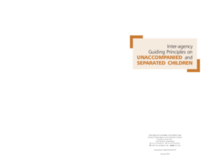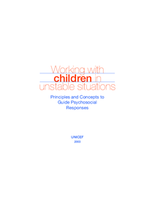Displaying 181 - 190 of 199
Provides guidance on role of humanitarian agencies in ensuring protection and appropriate care provision for separated and unaccompanied childre, with a particular emphasis on preserving family unity and ensuring identification, tracing and reunification is pursued.
This paper presents a set of global policy guidelines for the protection of children without parental care. It recommends the need for a global understanding of best practices within the legal framework of the UN Committee on the Rights of the Child.
A comprehensive framework to ensure that the rights and needs of separated children are effectively addressed. Guidelines aim to promote and support preparedness, coordination and good practice based on lessons learned. Addresses all aspects of an emergency from preventing separations, to family tracing and reunification, through to long-term solutions.
Core interagency resource on the principles of practice with separated and unaccompanied children. Includes prevention of separation, evacuation procedures, and tracing, reunification, and care arrangements.
This paper outlines some of the key issues facing separated children, which include physical, protective, psychosocial and guardianship needs. It describes program interventions to prevent separation, to trace and reunify families, to plan interim and long-term care arrangements for separated children.
Outlines UNICEF’s initial and follow-up responses in protecting and caring for women and children.
A paper discussing the shortcomings of systems in which separated children are placed into residential/ institutional forms of care. It also considers community-based and some other forms of care as alternative approaches to preventing unnecessary separation of children from their families.
Overview of a research study which provides guidelines for care of separated children in large-scale emergencies, focusing on the negative impact of residential care, extended family care, spontaneous and agency fostering, adoption, and alternative placements for adolescents.
Discusses the psychosocial impacts of unstable situations on children and their families, with an emphasis on child development. Includes UNICEF’s position on policy and programming principles as well as strategies to address the psychosocial needs of children, families, and communities.
Training module outlining key principles concerning the protection of children affected by armed conflict and displacement. Topics include legal frameworks, identifying protection issues, threats to children in emergencies, and promoting healthy child development.










